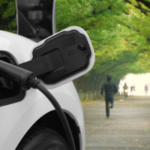
Seven things to consider before you buy an EV charger
20 March 2023
Installing EV charging in an apartment block: six success factors
20 March 2023Three reasons why 2024 is the year to install EV chargers in your apartment building
The Yellow Pages made way for Google.
CDs made way for Spotify.
Now, the internal combustion engine is making way for electric vehicles (EVs).
If you’re a property manager, you might already have residents asking about charging theirs.
Can I get a private charge point and run a cable to it?
When can we get them in the communal car park?
Sooner rather than later, sorting EV charging infrastructure will be number one on every property manager’s to-do list.
Here’s why you should make 2024 the year you install EV chargers.
1. The speed of change is electrifying
As part of the mission to decarbonise, the UK government has banned the production of petrol and diesel cars and vans from 2030, and hybrid cars and vans by 2035.
That’s just six years left for the internal combustion engine.
The pace of change is…electric.
Several car manufacturers have already stopped investing in petrol and diesel engine R&D.
The RAC estimates that 700,000 fully electric vehicles were on the road at the beginning of 2023. That’s up from 100,000 at the start of 2019. Seven-fold in four years.
It’s on homebuyers’ minds too.
Back in 2021, a Riverdale Leasing market analysis found that 76% of homes with an EV charger installed sold for more than the local average.
Reliable EV charging infrastructure is fast becoming as important as a good local school, a nearby train station, and a south-facing balcony.
Getting onto it now will future-proof your buildings for years to come.
2. The planet needs us to act quickly
Climate change is a growing threat for everyone. We’ve all got a responsibility to live more sustainably.
Electric cars aren’t perfect, but they’re the best option we have right now.
It takes about 30,000 miles to “repay” the carbon footprint involved in manufacturing an electric car.
In other words, after 30,000 miles you’ll have saved about the same level of carbon emissions generated by the manufacturing process. After that, it’s plain sailing.
But despite the benefits, plenty of people are hesitant to take the plunge.
They mainly worry about where they’ll charge up. It’s a particular headache for people who don’t live in a house with a private driveway.
If you’re managing an apartment block or other residential property, installing chargepoints will make it possible for your residents to ditch their diesel and petrol-powered cars and embrace EVs.
3. Government grants are available. For now
Putting in EV chargepoints involves upfront investment. But the government is firmly behind the transition and there are grants available.
The thing is, they won’t last forever.
We’ve seen it before with solar panels.
The government backed the industry to help it mature as quickly as possible. They paid healthy feed-in tariffs to anybody generating solar energy and selling it to the grid.
But once the market had gained momentum, the funding wound down.
That will happen with EV chargepoint grants too.
We don’t know how long the grants will be around for. When the plug gets pulled it could be at short notice and spark a mad dash.
Our advice? Get in as soon as you can.
The EV chargepoint and EV Infrastructure grants
There are two grants available to help you install EV chargepoints in flats and apartment buildings.
The EV chargepoint grant is open to both residents and property managers. You can get either £350 or 75% off the cost of a new chargepoint socket, whichever is lower.
For property managers and landlords with a portfolio, you can get up to 200 grants for residential properties and 100 grants for commercial properties each financial year.
There are usually costs over and above the price of the charge socket to think about.
Things like wiring, signage, and posts, for example.
Luckily, there’s a grant to cover these extras too.
You can get up to £30,000 or 75% off the cost, depending on how many parking spaces you’re kitting out. If you’re in charge of multiple properties, you can get grants for up to 30 sites.
The chargepoints must only be for residents, not for the general public. Each parking space must be accessible to your residents and be off-street, private, and clearly marked.
Applying for a grant
Because infrastructure is involved, it’s usually better to coordinate the work as a management company rather than residents getting chargepoints individually.
Before you start applying for the grant, you need to get a quote from an installer and choose a chargepoint model.
With decades of accumulated experience in the space, we can help you get everything lined up for your grant application.
We’ve also got a one-stop-solution for rolling EV chargepoints out across your property portfolio.
Find out more about our solutions for Property Managers here.

